We deserve clean soil.
“What does Healthy Soil mean to you?”
“What will make you be a good ancestor?”
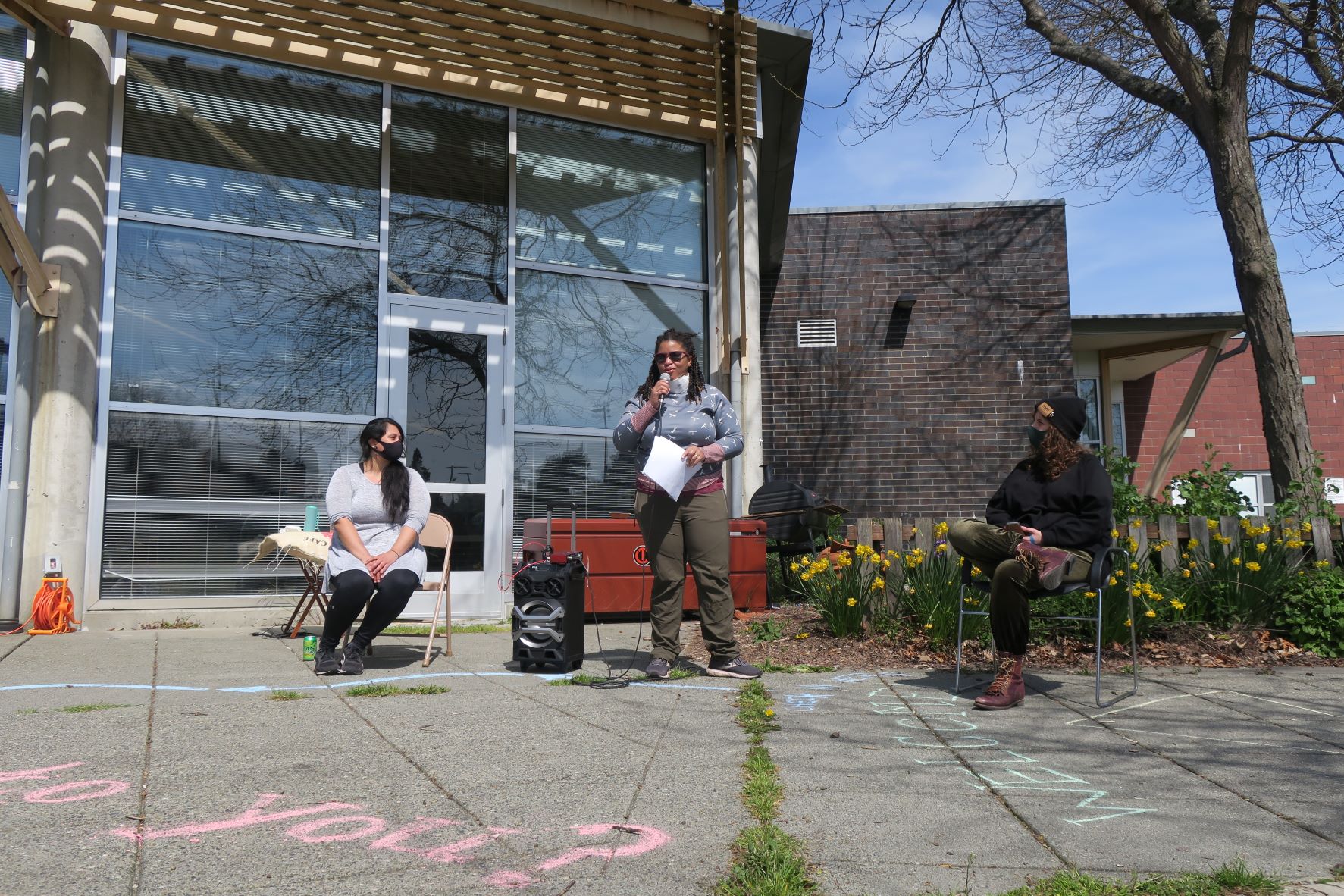
“It will take all of us working together.”
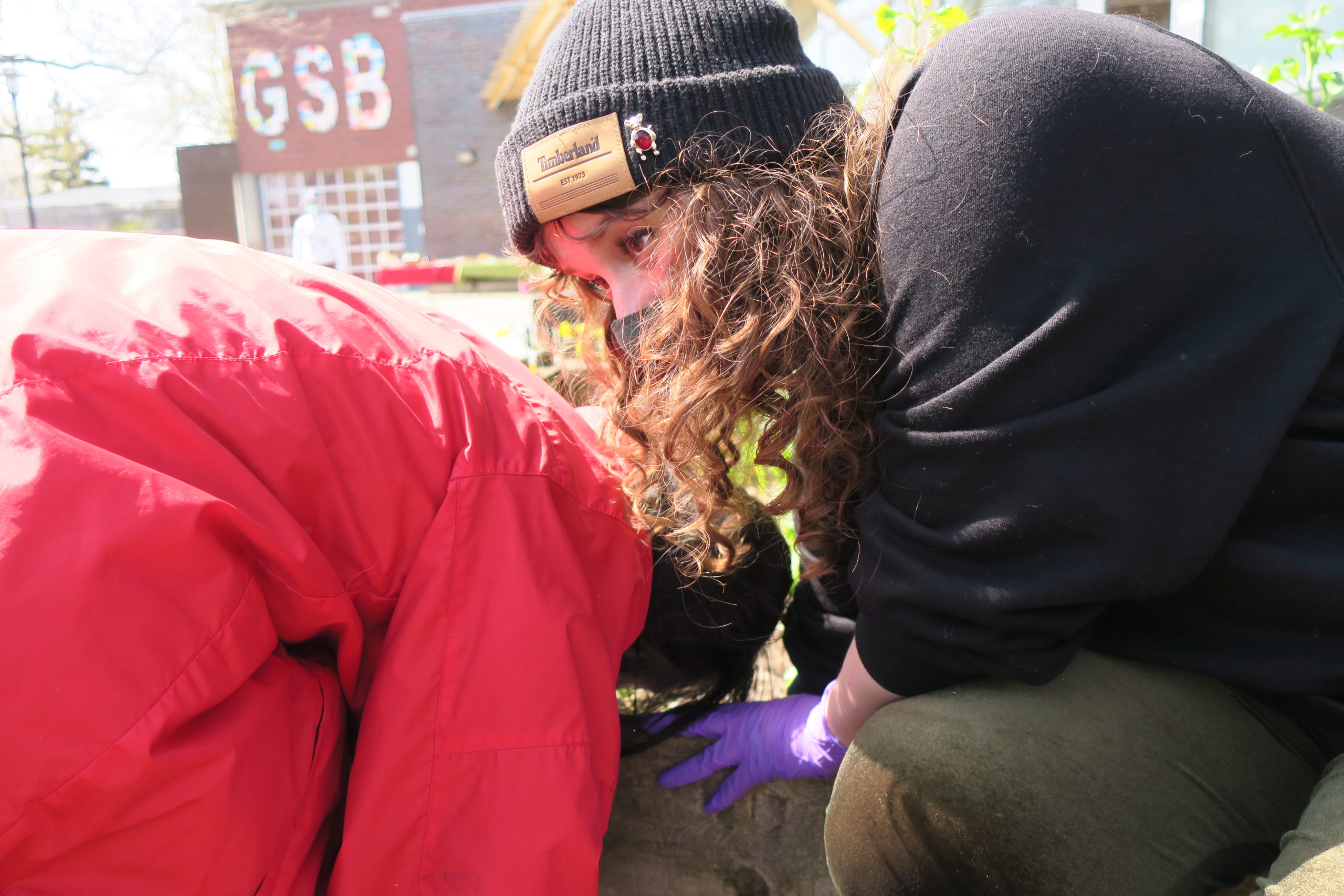
Tag: Sustainable Thoughts


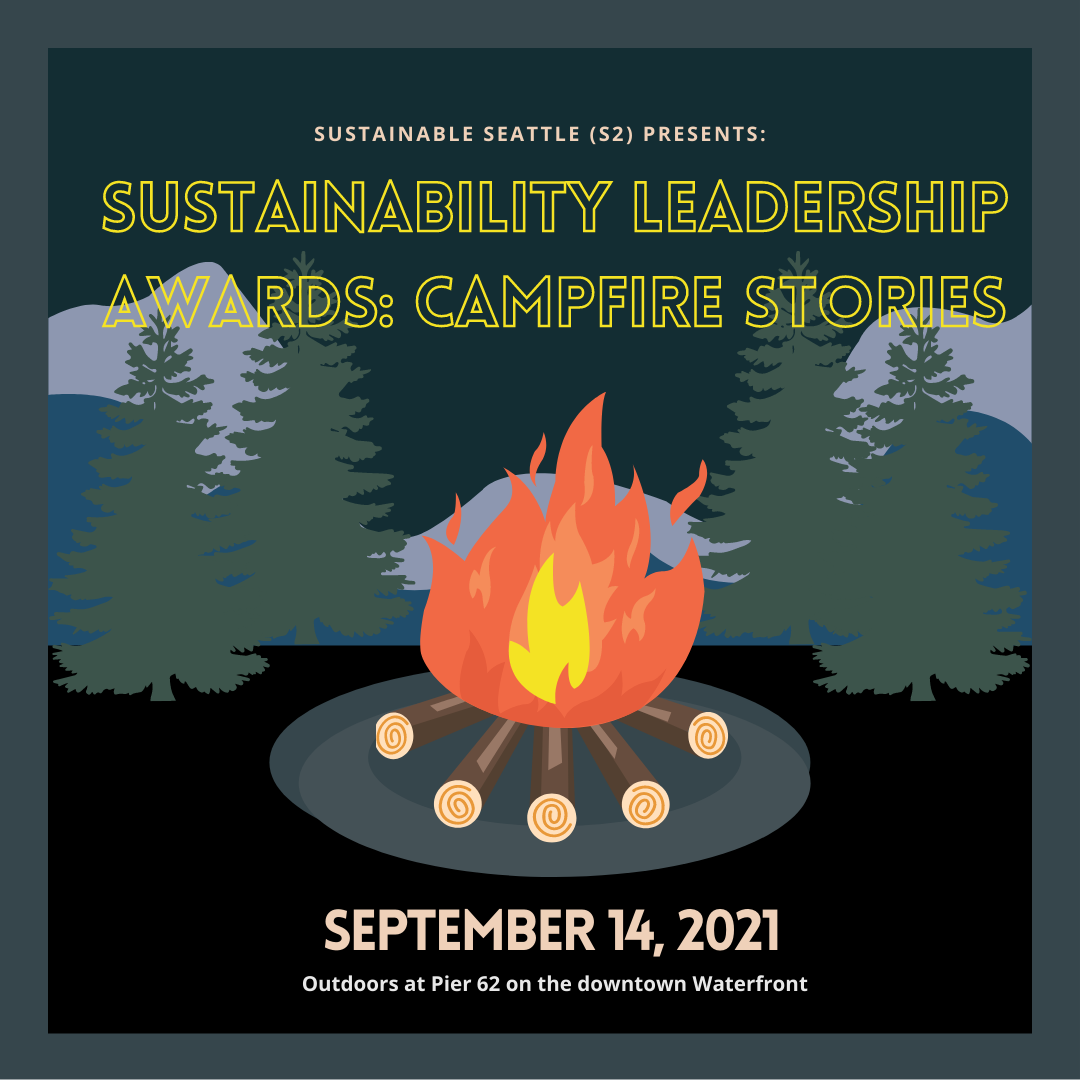
Each year Sustainable Seattle hosts the Sustainability Leadership Awards, also known as Campfire Stories, honoring leaders in sustainability. Communities are encouraged to nominate the sustainability leaders that they feel have a strong impact. These nominations are then voted on by an adjudication committee of people that represent the diversity of Seattle’s sustainability experts, and thinkers, in order to select the honorees. This year leaders were nominated based on their contributions to one of four major thematic categories of sustainable practice in the Seattle area, which were determined through a community0based participatory research project in Winter 2020-21: The Heart of Sustainability, Home for Good, Food & Gratitude, and Policy for People.
Every year the group of community leaders is an outstanding representation of all of the hard and inspiring work that is being done by sustainability leaders in frontline communities. While and honoree was selected to represent the thematic category, all of the community leaders were recognized for all of their contributions.
The Heart of Sustainability is centered around the guiding principles, morals, and values that inform our decision making. The community leaders for this category were
The honoree for the Heart of Sustainability is Ming Ming Tung-Edelman, the founder and ED of Refugee Artisan Initiative. As an immigrant from Taiwan, Ming Ming understands the challenges refugees and immigrants face. She wants to connect these women with the skills they have and opportunities to earn income to provide for their families in America. RAI combines Ming Ming’s compassion and her love for fashion and sustainability. Her dream has come true to create the RAI circular and equitable economy: keep textiles out of landfills while creating jobs for refugee and immigrant women.
Please read the story below that Ming Ming shared at the Sustainability Leadership Awards.
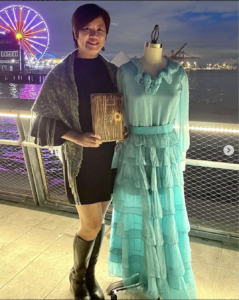 “Whenever people ask ‘What has inspired you to do this work?’ With no hesitation, I said: ‘Ama’, grandma in Taiwanese. A woman with rudimentary education who lived in a small village in Taiwan. Ama was able to put food on the table to raise my mom and my two uncles as a home based seamstress after her alcoholic husband died young.
“Whenever people ask ‘What has inspired you to do this work?’ With no hesitation, I said: ‘Ama’, grandma in Taiwanese. A woman with rudimentary education who lived in a small village in Taiwan. Ama was able to put food on the table to raise my mom and my two uncles as a home based seamstress after her alcoholic husband died young.
Ama sewed many matching outfits for me and my late sister Mingi-Yen, who is a year younger than me. We look practically like adorable twins in matching plaid suits, Chinese Qipao jackets, floral summer dresses, and countless other looks. There was always the sounds of her foot pedal sewing machine in her house, as she worked away making customized garments for ladies in the neighborhood.
When she learned that my family would be leaving Taiwan to move to Saudi Arabia in a couple months, she took measurements of my sister and me. She then took out two rolls of chiffon fabric she had carefully stored away for years, one turquoise and one crisp apple green, and intently began to make us dresses. As you can see here, chiffon is one of the toughest fabrics to sew as it’s extremely delicate, snags and breaks easily when sewing. Still to this day I don’t know what compelled Ama to make me such a fancy ruffle dress. Perhaps it was a good-bye gift to me as she passed a few years later and I never got to say ‘good-bye’. Perhaps it was her dream for me as a teenager to wear it to a formal dance in a foreign country. I did wear it at my middle school graduation in Saudi Arabia and was the fanciest graduate with many staring eyes.
With two global moves from Taiwan to Saudi Arabia and America, this dress came with me. About nine years ago, my daughter Anna ever wore it for a family reunion dinner in Taiwan. The dress had traveled around the globe with me and my family.

Today this dress is on this model at the display window of Refugee Artisan Initiative, as a guide and inspiration. Ama has taught me what it means to give a woman tools and skills to become self-sufficient and financially independent. As an immigrant woman, it’s my way of giving back and paying it forward. I feel incredibly honored to be working with 25 talented women artisans in our program from all over the world resettling in Seattle during the past five years … Burma, Ethiopia, Afghanistan, Morocco, Bhutan, Vietnam, and China.
One artisan, Diba, mother’s five from Afghanistan, her story really stood out … as an example of heart of sustainability.
Diba and her family escaped the Taliban not once, but three times in a span of over 20 years. Her family escaped to Iran then Turkey as refugees during the first Taliban attack. When the US occupation of Afghanistan occurred, the moved back, had some stability as Diba’s husband worked in generator maintenance at the US military base. However, with Taliban’s violence against its citizens rising, the family did not feel safe, again escaped to Turkey about seven years ago. They finally applied for refugee status to be resettled to the United States. Diba, her husband Abdul and five children aged 3 and 21 finally made it to Seattle as home 4.5 years ago.
Diba’s job prospects in America was grim: little and no education, not speaking English, not able to drive and five children to care for… Until she connected to RAI 1.5 years ago.
You see… Diba is a self taught sewer and crafter and quick learner like Ama. She sews and knits most of her clothes and many other clothes for her family. Her sewing skill came in handy at the beginning of the pandemic where there were no masks to be found. Diba along with another 11 RAI artisans sew over 80,000 masks from home, repurposed from donated clean unused bed sheets from Amazon returns. Their work helped to protect healthcare workers, metro bus drivers, prisoners, postal workers, and countless others.
Diba made her her first paycheck in America from our program and more. Three months ago Diba came with her husband and showed me and my staff a car she just purchased for her husband, so he can have a better car as an Uber driver. Despite her busy home life and sewing/knitting projects, Diba finds time to show appreciation. She often brings the Afghanistan salty cake she makes, and one time we had an Afghan feast with three giant trays of Afghanistan steam dumplings and honey cake. She made a separate gluten free aromatic chicken dish for one of my staff when she learned about her dietary restrictions. Out of nowhere one day, Diba presented me with this beautiful shall that took her over 10 hours to knit… saying how thankful she is to be part of RAI family.
Early last month, Diba flew back to Afghanistan with her nine-year-old daughter to attend her sister’s wedding as she has not seen her for over a decade. She would return on 8/17, the day after the Talilban took over the country. The thought of Diba’s husband with her four sons here alone without Diba and her daughter Yalda was unthinkable! Our entire team at RAI knew we needed to take action to get them out and safely back home before anything happened to them.
We reach out to WA State representatives Congresswoman Pramila Jayapal and Kim Schrier for help to get Diba, her daughter, and Diba’s oldest son’s wife out of Afghanistan. Despise multiple failed attempts to get them to the Kabul airport, we persisted until we were finally able to get them on a plane. Their plane took off hours before last week’s deadly attack at the Kabul airport. Their safe return is a true miracle.
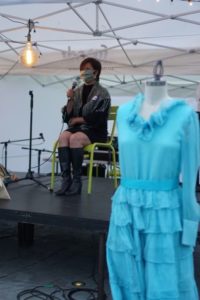 So what does Heart of Sustainability mean to me? On two levels:
So what does Heart of Sustainability mean to me? On two levels:
1. Organizational level: Practice circular equitable economy by diverting unwanted textiles while creating jobs for refugee and immigrant women.
For example: Our artisans turn unwanted clean bed sheets into masks and now medical scrubs with mask demands being down. Turn empty coffee bean burlap bags into beautiful baskets and wine bags.
2. Personal level: Show love and caring in the most authentic way that results in meaningful actions.
My Ama showed it through this amazing dress now a family heirloom!
I show it to Diba through providing her pathway to become self-sufficient and help to bring her home safely from Afghanistan.
Diba shows it through her delicious Afghan food she shared with RAI and this shawl now keeps me warm.
Through these authentic interactions, lives changed and legacy lives on. I can feel Ama’s spirit as she is smiling from heaven. “

A Day at the Farm with Hannah
Each year Sustainable Seattle hosts the Sustainability Leadership Awards, also known as Campfire Stories, honoring leaders in sustainability. Communities are encouraged to nominate the sustainability leaders that they feel have a strong impact. These nominations are then voted on by an adjudication committee of people that represent the diversity of Seattle’s sustainability experts, and thinkers, in order to select the honorees. This year leaders were nominated based on their contributions to one of four major thematic categories of sustainable practice in the Seattle area, which were determined through a community0based participatory research project in Winter 2020-21: The Heart of Sustainability, Home for Good, Food & Gratitude, and Policy for People.
Every year the group of community leaders is an outstanding representation of all of the hard and inspiring work that is being done by sustainability leaders in frontline communities. While and honoree was selected to represent the thematic category, all of the community leaders were recognized for all of their contributions.
Food & Gratitude is centered around culturally connected food justice and sovereignty. The community leaders for this category were:

The honoree for this category is Hannah Wilson, the leader of YES Farm and a prominent Black farmer in Seattle. They were honored for their embodiment of Food & Gratitude and their work in actively fighting for food justice. YES Farm is located in the Central District and is part of The Black Farmers Collective. The Black Farmers Collective is a group of urban food system activists dedicated to providing opportunities to improve the health of our communities through all aspects of the food system. Their vision is based in the need for a place for African American leadership on the land, the Kwanzaa principle of cooperative economics, and the realization that mitigating the climate crisis requires action to support local production, carbon sequestration, and natural habitat creation.
Please read Hannah’s story below that they shared at the Campfire Stories.
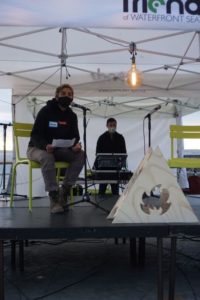 “Hello everyone, again my name is Hannah and I’ve been working at Yes Farm for the last year and a half with the Black Farmers Collective, for this campfire story I’m taking y’all to the farm with me…
“Hello everyone, again my name is Hannah and I’ve been working at Yes Farm for the last year and a half with the Black Farmers Collective, for this campfire story I’m taking y’all to the farm with me…
In the morning, I put on my boots, make sure my coffee thermos and water bottle are in my bag, phone/wallet/keys, hat, sunscreen, utility knife, hori hori, and gloves. Got it. Check.
I carefully drive down the dirt construction road on the narrow property next to the farm that serves as my access road. I think about how the area is soon to be developed into two 23 story highrise apartment towers and that any evidence of the old historical public housing is gone. I thought about how these new apartments would block the morning sun, and also erase the history of the first integrated housing project in the country built in the 1960s, years later cut in half by the construction of I-5 freeway, displacing many. I notice the double takes when my 5’3″ self, in all my black mixed race non binary queer deaf and disabled ways turn my truck into the farm each day. As I step out of the car, I feel some of that precious Seattle sun, and I can hear the low roar of the freeway that straddles the other side of the farm. Occasionally I hear car crashes as I am weeding or watering plants or talking to community members and volunteers. I lost count a while ago. I look over, seeing the Yesler overpass. Famously called profanity hill, because it’s such a painfully steep climb up the hill. Do people know that this is the original skid row? That giants logs used to be pushed down that steep hill when the Coast Salish Territory began to be colonized and clear cut most of its forests? I try to remind people of the history of this land as much as I can, going back to the Indigenous folks who have been here since time immemorial, through colonization, industry, redlining, gentrification, and all the communities throughout. Who would’ve imagined this place would eventually be a farm for Black genius and creativity and care & a model of food sovereignty and self determination?
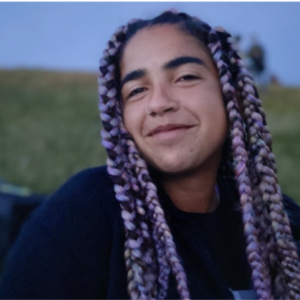
Its’s peak harvest season, so when I look back out onto the farm that I’ve poured my heart out into for the last 18 months, I can truly see the fruits of my labor. What used to be a mostly grass field is now a full blown farm with a greenhouse, community garden. rows of crops for selling and distributing produce, herbal garden, beehives, tree orchard, and much more. When I look out, I also see all the other faces of people and community who worked alongside me, shared their vision with me, trusted me, and built a relationship with me and the land here.
I could go on. The farm day fills my heart, and ends as I pull off my gloves, throw my bag and harvest for the day into my truck, and yank off my tired boots. Time to rest until tomorrow.
It’s an honor to be with you all tonight, thank you so much.”
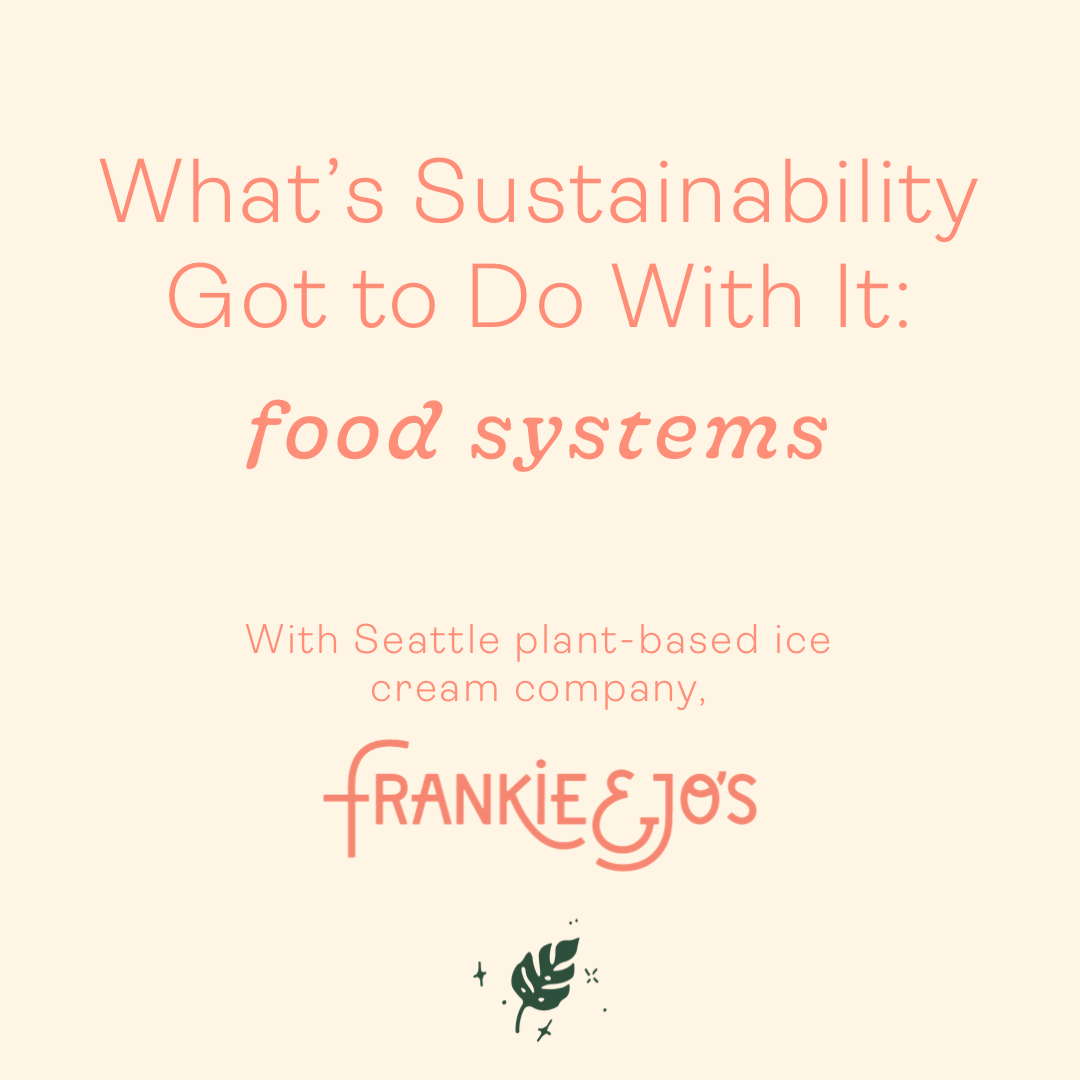
Sustainable Thoughts by Jac Sussman
Practicing true sustainability requires a whole-systems approach to strengthening social, ecological, and economic vitality for current and future generations. Founded in 2016 by Autumn Martin and Kari Brunson, Frankie & Jo’s is a women-owned ice cream company that fully embodies this vision, setting ambitious goals to lower their carbon footprint, enhance the financial stability of their employees, and uplift those in the community who have been most impacted by environmental and social inequities.
Certified B Corporations are businesses that meet rigorous third-party standards for social and environmental contribution, public transparency, and legal accountability to align their profits with positive societal impact. Even before they became a B Corp company, Frankie & Jo’s was already demonstrating how small businesses can operate in ways that provide a net benefit to their community and the environment.
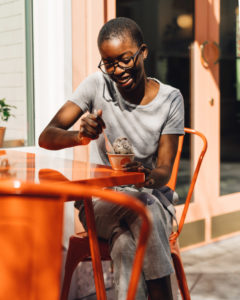
Conscious of the vast, rapidly growing economic disparities in Seattle, Frankie & Jo’s is making material changes to increase the financial stability of their team, through such policies as reimbursing employee bus passes and bicycle parts with their sustainable commuter benefits program, and providing a $20 per month allowance to spend on anything related to self-care. Team members are recognized and rewarded for their efforts, commonly being promoted from within to more advanced positions throughout the company. Kelsie Coker first joined Frankie & Jo’s as a part-time baker and was promoted to Administrative, Logistics, and Sustainability Lead, helping the company meet its many environmental and social goals. Natalie Vanhoever started scooping up the flavorful plant-based goodness for customers and is now Frankie & Jo’s Marketing Manager.
Frankie & Jo’s regularly promotes and partners with other women and BIPOC-led businesses, organizations, and artists across Seattle and the Puget Sound region. Those in leadership roles go through DEI training and are actively propelling a more inclusive and equity-focused workplace through both company culture and policies. “I think we just gravitate towards [partnering with women and BIPOC-led businesses], but it’s also part of the ethos of our company. It’s naturally a part of our culture,” says Natalie.
Holding an unwavering dedication to reducing their carbon emissions as swiftly as possible, Frankie & Jo’s has committed to reaching net zero by 2050, in accordance with the Paris Agreement. This goal requires them to find creative solutions to cut both upstream and downstream emissions as a business in the food industry, where food waste, global transportation, and excessive food packaging are pervasive setbacks to operating sustainably.

With a key priority on eliminating food waste altogether, the company is working with local no-cost meal services and food banks to donate all of the surplus cookies, brownies, and pints that would otherwise be directed into the compost bin. They also work closely with suppliers and hold them accountable in meeting Frankie & Jo’s high environmental and social standards, sometimes making the tough decision of switching to vendors who are more aligned with their goals and ethos. The company purchases carbon offsets for areas where carbon emissions are currently unavoidable as part of running any successful business, such as with shipping for their pint club subscription service (for which they’ve offset nearly 100% of emissions).
Try as they might to reduce their carbon footprint, conventional ice cream companies face an uphill battle when their products are dairy-based. According to the UN’s Food and Agriculture Organization (FAO), cattle raised for milk are responsible for approximately 20% of the global livestock sector’s GHG emissions. As a species, cows represent roughly 65% of the entire livestock sector’s emissions and are the largest source of agricultural GHG emissions worldwide.
Those who sample the delectable alchemy that is Frankie & Jo’s ice cream are often in disbelief that the treats are entirely dairy-free. Frankie & Jo’s recently switched all of their ice cream from a homemade cashew and coconut milk base to their homemade oat milk base, after realizing that they could reduce GHG emissions and cut down on water usage in their kitchen, while also improving ice cream flavor and texture consistency. Their method for making oat milk has substantially reduced water usage that was previously required to make their cashew milk base. For comparison, every pint of dairy milk requires approximately 120 liters of water to make, while cashew milk requires 68 liters of water per pint, and oat milk only 10 liters of water. On average, a pint of oat milk generates less than a third of the greenhouse gas emissions released to make a pint of dairy milk. Frankie & Jo’s continually pursues sourcing the most sustainable ingredients available, and understands that enduring sustainability requires an ongoing journey towards complete decarbonization.
Exemplifying the principles of a circular economy, Frankie & Jo’s seeks to decouple profits and financial growth from an extractivist business model⏤instead working towards becoming zero waste and contributing to building a more equitable and resilient community. Frankie & Jo’s donates a percentage of sales annually to social justice organizations around the city, and partners with numerous food banks and meal services, including Black Mamas Matter, El Centro de la Raza, Mary’s Place, The Seattle BIPOC Organic Food Bank, and YouthCare.
Achieving B-Corp certification in 2020, Frankie & Jo’s was ready to be held accountable to the highest of standards for all of their sustainability targets.
“We continuously work to be better,” says Frankie & Jo’s sustainability lead, Kelsie Coker. With their B-Corp recertification less than two years away, the team is striving to meet their goals ahead of time. “We want to show that we’re doing the work.”